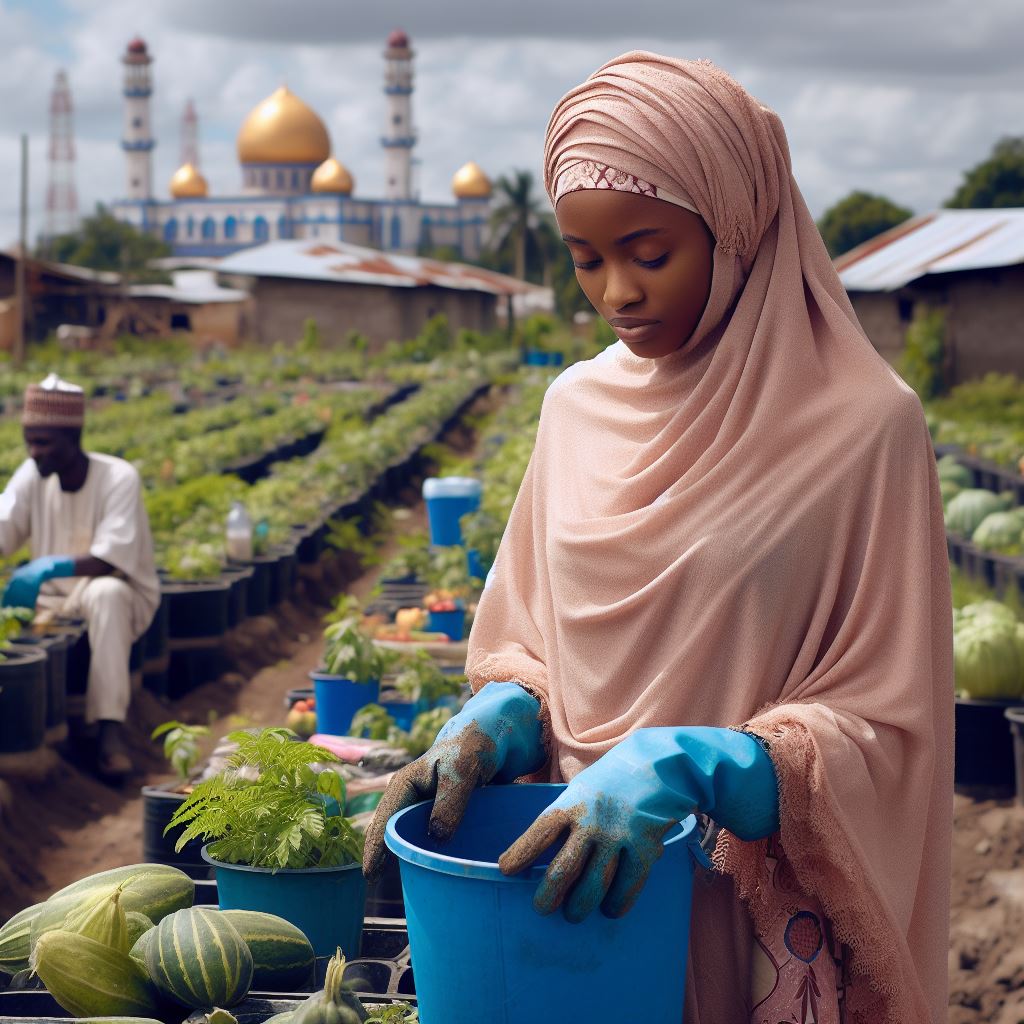Introduction
In this blog post, we will explore Climate Change and Agricultural Economics.
In recent years, Nigeria has experienced significant changes in its climate.
Rising temperatures, unpredictable rainfall patterns, and increased frequency of extreme weather events have all contributed to the phenomenon of climate change in the country.
These changes have had a profound impact on the agricultural sector, which plays a crucial role in Nigeria’s economy.
Agriculture is the main source of livelihood for a large percentage of the Nigerian population.
It provides employment opportunities and contributes to the country’s food security and economic growth.
However, the interplay between climate change and agricultural economics in Nigeria presents several challenges.
The changing climate has led to decreased agricultural productivity and increased crop failure.
Farmers are struggling to adapt to the evolving conditions and are often faced with reduced yields and losses.
This situation further exacerbates food insecurity, poverty, and unemployment in the country.
Moreover, the economic impact of climate change on Nigeria’s agriculture extends beyond the farming communities.
It affects the entire value chain, including transportation, food processing, and marketing.
This interplay creates a ripple effect throughout the economy, leading to increased food prices and reduced purchasing power.
This blog post will explore the complex relationship between climate change and agricultural economics in Nigeria.
It will highlight the challenges faced by farmers and the broader implications for the country’s economy.
Climate Change in Nigeria
Description of climate change phenomena in Nigeria
Nigeria, located in West Africa, is highly vulnerable to the impacts of climate change.
The country has experienced several climate change phenomena that have been affecting its agricultural sector.
These phenomena include rising temperatures, changing rainfall patterns, increased frequency of extreme weather events, and rising sea levels.
Impact of climate change on weather patterns
Climate change has significantly disrupted the weather patterns in Nigeria.
Some regions are experiencing longer dry seasons with extended periods of drought, while others are facing increased rainfall intensity and flooding.
These changes in weather patterns have had a profound effect on agricultural activities in the country.
Major climate change challenges faced by Nigerian farmers
Decreased agricultural productivity
Climate change has led to reduced crop yields and lower livestock productivity, affecting the livelihoods of Nigerian farmers.
Rising temperatures and changing rainfall patterns have made it challenging for farmers to predict planting and harvesting seasons accurately.
Loss of arable land
Rising sea levels and erosion caused by climate change have led to the loss of arable land in coastal areas.
This reduces the available land for agricultural production and displaces farming communities, exacerbating food insecurity in these regions.
Increased pests and diseases
Climate change has provided a favorable environment for the proliferation of pests and diseases.
Higher temperatures and increased humidity create ideal conditions for pests to thrive, leading to crop losses and increased reliance on pesticides, which further endangers the environment and human health.
Water scarcity
Changing rainfall patterns have resulted in water scarcity in many regions of Nigeria.
This poses challenges for irrigation systems and livestock watering, ultimately affecting agricultural production and food security.
Loss of biodiversity
Climate change threatens the biodiversity of Nigeria’s agricultural landscapes.
Changes in temperature and rainfall patterns can disrupt ecosystems, leading to the loss of native plant and animal species crucial for maintaining ecosystem services and sustainable agriculture.
Socioeconomic implications
Climate change impacts are not just limited to the environmental sphere but also have substantial socioeconomic implications.
Small-scale farmers, who rely heavily on rainfed agriculture, are particularly vulnerable to climate change’s adverse effects.
Their limited resources and access to technology make it difficult to adapt to changing conditions, perpetuating poverty and inequality.
Food security and nutrition
The interplay of climate change and agricultural economics in Nigeria has severe implications for food security and nutrition.
Reduced crop yields and livestock productivity, coupled with rising food prices, hinder access to affordable and nutritious food, leading to malnutrition and hunger.
In essence, climate change poses significant challenges to Nigeria’s agricultural sector.
The country experiences various climate change phenomena, impacting weather patterns and agricultural practices.
Nigerian farmers face decreased productivity, loss of arable land, increased pests and diseases, water scarcity, loss of biodiversity, socioeconomic challenges, and threats to food security and nutrition.
Addressing these challenges requires comprehensive adaptation strategies, policies, and investments that prioritize building climate resilience in agriculture and supporting farmers in adapting to changing conditions.
Transform Your Career with Expert Guidance
Get personalized mentorship consulting that’s tailored to your unique path. Our expert advice is actionable and exclusive.
Get StartedRead: Innovative Farming Techniques in Nigerian University Curricula
Agriculture in Nigeria
Overview of the agricultural sector in Nigeria
- Nigeria’s agricultural sector plays a crucial role in its economy.
- The sector encompasses farming, livestock rearing, fishing, and forestry.
- It provides employment for a significant portion of the population, especially in rural areas.
- Agriculture contributes to food security and poverty reduction.
Importance of agriculture to the Nigerian economy
- Agriculture is a major source of revenue and foreign exchange earnings for Nigeria.
- It contributes significantly to the country’s Gross Domestic Product (GDP).
- Nigeria is blessed with fertile land, favorable climate, and diverse agro-ecological zones.
- Agriculture attracts investments and promotes rural development.
Major crops and farming practices in Nigeria
- Nigeria cultivates a wide range of crops such as rice, maize, sorghum, yam, cassava, and millet.
- These crops form the foundation of the Nigerian diet and food culture.
- Farming practices in Nigeria vary depending on the region and crop.
- Traditional farming methods, such as slash-and-burn and shifting cultivation, are still prevalent.
- However, modern techniques like mechanized farming and irrigation are gaining popularity.
- The government promotes improved farming practices to enhance productivity and sustainability.
- Smallholder farmers constitute the majority in Nigeria, and their productivity is crucial for national food security.
In fact, agriculture plays a vital role in Nigeria’s economy, providing employment, revenue, and food security.
The country’s diverse agro-ecological zones allow for the cultivation of various crops, forming the basis of the Nigerian diet.
While traditional farming practices persist, there is a growing adoption of modern techniques to increase productivity and sustainability.
It is essential to support smallholder farmers, who constitute the majority, to ensure long-term food security in Nigeria.
Read: Comparing Agri Extension Training Across West Africa

Discover More: Top Livestock Equipment Suppliers in Nigeria
Interactions between Climate Change and Agricultural Economics
Effects of climate change on agricultural productivity
Climate change has significant effects on Nigeria’s agricultural sector, which heavily relies on rainfall to sustain crop growth.
Changes in rainfall patterns disrupt farming activities, leading to reduced crop yields.
Additionally, the increased frequency of extreme weather events, such as floods and droughts, poses a threat to crops and livestock, causing substantial losses for farmers.
Rising temperatures and prolonged droughts further aggravate the situation, as they contribute to water scarcity and hinder agricultural productivity.
Impacts of climate change on agricultural yields and profitability
The impact on agricultural yields and profitability is profound.
With reduced crop yields and increased crop losses, farmers struggle to meet the demands of the population, resulting in lower agricultural output.
Livestock farmers also face declining productivity, as heat stress affects the health and reproduction of animals, while limited forage availability affects their nutrition.
These challenges not only affect the farmers’ livelihoods but also contribute to a decline in the country’s overall economic growth.
Economic implications of climate change on the agricultural sector
The economic implications of climate change on the agricultural sector are far-reaching.
Farmers incur increased production costs as they need to invest in adaptation strategies such as irrigation systems or crop diversification.
These additional expenses strain the already limited resources of small-scale farmers, making it difficult for them to cope with the changing climate conditions.
The loss of income for farmers due to reduced yields and increased crop losses adds to the economic burden.
Many farmers heavily rely on their agricultural activities as their primary source of income.
As a result, they face financial instability, which hinders their ability to sustain their livelihoods and invest in modern farming techniques.
Food insecurity becomes a significant concern as climate change negatively impacts agricultural production.
Reduced crop yields and declining livestock productivity lead to a shortage of food supply, resulting in rising food prices.
The vulnerable population, including low-income households and rural communities, experiences difficulties in accessing affordable and nutritious food.
In short, the interplay between climate change and agricultural economics in Nigeria has severe consequences.
Changes in rainfall patterns, increased frequency of extreme weather events, rising temperatures, and droughts all contribute to reduced agricultural productivity and profitability.
The economic implications are vast, with increased production costs, loss of income for farmers, and food insecurity being the main concerns.
It is crucial for Nigeria to prioritize climate change adaptation strategies and invest in sustainable agricultural practices to mitigate the adverse effects and secure the future of the agricultural sector.
Read: Exploring Postgraduate Opportunities in Agricultural Economics in Nigeria
Adaptation Strategies in Agricultural Economics
Introduction to adaptation strategies
Adaptation strategies are crucial in addressing the effects of climate change on agriculture.
These strategies involve implementing measures to help farmers cope with changing conditions.
Proper adaptation strategies can contribute to sustainable agricultural practices and food security.
Government initiatives to mitigate climate change effects on agriculture
- Climate-smart agriculture programs: Government initiatives focus on promoting practices that reduce emissions and increase productivity.
Climate-smart agriculture programs are implemented to promote sustainable farming practices. - Investment in agricultural research and development: Government funding supports research to develop climate-resilient crops and farming techniques.
Investment in agricultural research and development is vital to enhance resilience in the sector.
Farmer-led adaptation practices
Farmers play a crucial role in implementing adaptive measures.
They can make shifts in crop choices and adjust planting calendars based on changing climate patterns.
Water management techniques, such as efficient irrigation systems, can help farmers combat drought conditions.
Utilizing climate-resilient farming practices, such as conservation agriculture, helps mitigate risks.
- Shifts in crop choices and planting calendars: Farmers adapt by selecting crops that are more resistant to changing temperature and rainfall patterns.
- Water management techniques: Farmers employ methods like rainwater harvesting and drip irrigation to optimize water use.
- Utilization of climate-resilient farming practices: Farmers integrate practices like agroforestry, cover cropping, and soil conservation to enhance resilience.
Read: How Farm Management in Nigeria Addresses Climate Change
Conclusion
Recap of the interplay between climate change and agricultural economics in Nigeria
Throughout this blog post, we have explored the intricate relationship between climate change and agricultural economics in Nigeria.
We have seen how changing climatic conditions such as increased temperatures, erratic rainfall patterns, and extreme weather events have had a profound impact on the agricultural sector.
These changes have disrupted farming activities, reduced crop yields, threatened livestock production, and ultimately affected the livelihoods of farmers.
Importance of addressing climate change impacts on agriculture
Addressing the impacts of climate change on agriculture is of utmost importance for Nigeria’s sustainable development.
Agriculture remains a key sector, employing a large population and contributing significantly to the country’s GDP.
Without proper adaptation and mitigation strategies, the effects of climate change will continue to hamper agricultural productivity, exacerbate food insecurity, and increase rural poverty.
Call to action for sustainable practices and policy interventions
To secure the future of Nigeria’s agricultural sector, urgent action is required.
This involves implementing sustainable agricultural practices such as climate-resilient crop varieties, efficient water management, and improved soil conservation techniques.
Policy interventions aimed at promoting climate-smart agriculture, investing in research and development, and providing financial support to smallholder farmers are essential.
Collaboration between government agencies, researchers, farmers, and civil society is crucial for initiating and implementing effective measures.
The interplay between climate change and agricultural economics in Nigeria is a complex issue that demands immediate attention.
By addressing the impacts of climate change on agriculture and adopting sustainable practices and policy interventions, Nigeria can secure a resilient and prosperous future for its agricultural sector, ensuring food security and improving the livelihoods of its farming communities.
Let us join hands and work towards a sustainable and climate-resilient agricultural system in Nigeria.




